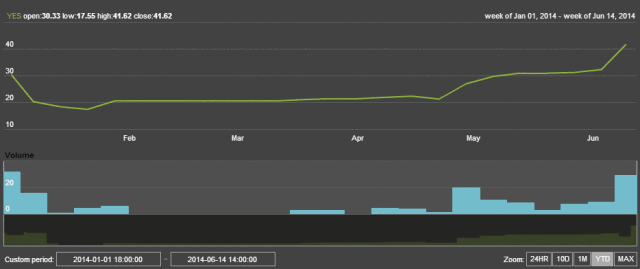June 14, 2014
Since the start of the year, our early-warning system's opinion pool has included a question about the risk of a new episode of state-led mass killing* occurring in Iraq before 2015. As noted in a recent post, our forecasters have consistently seen that country as one of the cases at greatest risk worldwide, and their concern increased significantly in May as the civil war in predominantly Sunni parts of the country escalated. Well, those forecasters' estimate of the risk of a new state-led mass killing in Iraq has just jumped again. As the chart below shows, in the past week our opinion pool's aggregate forecast on this question has risen from roughly 30 percent to more than 40 percent. This sharp upturn has apparently come in response to the sweeping territorial gains made by the Islamic State of Iraq and Syria (ISIS) in the north and west of the country, and to the concerns those gains are raising about how the central government will respond (see here and here, for example). In our forecasters' minds, Iraq now stands second only to Myanmar in its susceptibility to a new episode of state-led mass killing before the end of this year.

Aggregate forecast for "Before 1 January 2015, will an episode of state-led mass killing occur in Iraq?"
Before signing off, it's important to clarify that our opinion pool asks specifically about the risk of state-led mass killing in Iraq, and not about mass killing by non-state actors, because we judge that the latter is already underway and has been for a while, in the form of the frequent car bombings and other indiscriminate attacks carried out by Iraqi insurgents. If anything, that ongoing episode now appears set to get even worse, and it certainly warrants global attention as well. Still, we have chosen to focus our early-warning system on trying to foresee new episodes of mass atrocities rather than comparing or anticipating the dynamics of ongoing ones.
View All Blog Posts